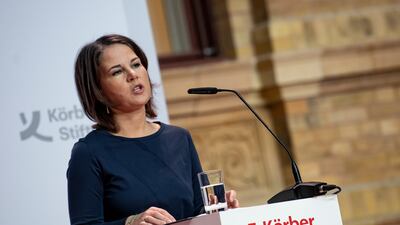Germany's foreign minister on Tuesday rejected what she said were naive calls for Ukraine to cede territory in a peace deal with Russia.
Annalena Baerbock told a policy forum in Berlin that accepting a Russian land grab would repeat the West's mistakes after the annexation of Crimea in 2014.
And turning her back on a long-held maxim of German foreign policy, she said: “For Europe it is not about security with Putin's Russia; for Europe it is about security from Putin's Russia.”
Ukraine was hit by renewed Russian bombardment on Tuesday in which one person was reported dead. Power was knocked out in some places after strikes against energy facilities, officials said.
German Defence Minister Christine Lambrecht said Russian generals launching air strikes "want people to give up their bravery, their courage".
Russia was also accused of kidnapping two workers at the Zaporizhzhia atomic power plant, with their whereabouts unknown, adding to concerns about nuclear safety.
As the fighting continues to rage, the government in Kyiv has been urged by countries including Turkey and Hungary, and outside voices from Henry Kissinger to Elon Musk, to seek a negotiated peace.
But Ukrainian President Volodymyr Zelenskyy said recently there was no prospect of negotiations while his counterpart Vladimir Putin was in power.
Ms Baerbock said: “We hear many careless statements, like saying 'it’s not necessary to have absolute territorial integrity, we need to negotiate, we need to go for compromise so that finally we can have peace again'.
“I say very clearly: such demands are naive, and such naive strategies already failed in 2014.”
The Green party politician said pleas from diplomats for Russia to call off its attack had not succeeded, with Mr Putin instead mobilising more troops.
“He isn't recruiting experts for negotiations. He's recruiting new soldiers in order to attack Ukraine,” she said.
“These Russian tanks and soldiers do not bring peace to Ukraine. What they bring, especially in the east of Ukraine, is awful crimes.
“A peace dominated by one side is not peace for the people in the east of Ukraine.”

Russia announced the annexation of the Donetsk, Luhansk, Zaporizhzhia and Kherson regions last month. The move was widely denounced by international powers and led to fresh sanctions on Moscow.
Ms Baerbock's statement that Russia is a threat to European security marks another break with Germany's pre-war desire for good neighbourly relations with the Kremlin.
A mixture of war guilt and economic needs long made Germans nervous about confronting Russia, and a 1970s policy of detente that paved the way for German reunification is revered by Chancellor Olaf Scholz's party.
As recently as February, barely a week before the invasion, Mr Scholz repeated the adage that security in Europe “can only be achieved with Russia”.
But the change of tune since then reflects what Thomas Paulsen, the head of the Koerber Foundation organising the summit, described as the failure of Germany's Russia policy.
Germany is paying a high price for its “policy of looking the other way” while Russia meddled in Ukraine and became increasingly repressive at home, he said.
Ukraine conflict — in pictures
“Peace cannot be had for free. Those who do not pay the price of peace, who do not invest in peace, will regret it later on, and in the worst case pay with a loss of peace,” Mr Paulsen said.
“In Germany over the past 30 years after reunification, we have somewhat lost sight of this connection.”
Ms Lambrecht was confronted with a poll by the foundation suggesting 68 per cent Germans would still be uncomfortable with a military leadership role in Europe, with only 29 per cent in favour.
She responded that Germany would not seek to push other countries around but play a co-ordinating role, as it did in setting up a 15-member air defence alliance under Nato.
Ms Baerbock admitted that Germany had sometimes failed to inspire confidence among its neighbours in Eastern Europe that it was a reliable security partner.
A report declassified last week showed Germany dismissing concerns from neighbours as recently as October 2021 that Russia would use gas pipelines as a weapon.
Ms Baerbock said a planned €100 billion ($98.5bn) upgrade of Germany's military would ensure that it can it “be there to ensure the security of people in Tallinn, Riga, Vilnius or Warsaw whenever necessary”.
Germany is also racing to end its dependency on Russian gas. The first liquid gas imports from the Gulf are expected to arrive this year, and condemned coal and nuclear plants will be made available to plug the gap.



































